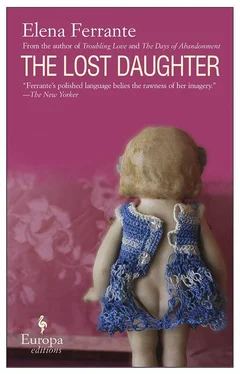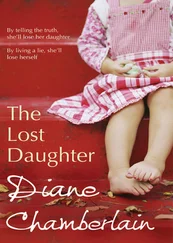“Would you like to come up,” I asked.
He made a gesture of no, he was embarrassed, he said:
“It’s beautiful, the gift you gave Nina.”
It irritated me that they had managed to see each other and that she had even showed him the pin. He added:
“She was really grateful for your kindness.”
I grumbled a yes, I was pleased. Then he said:
“I have something to ask you.”
“What.”
He didn’t look me in the face, but stared at the wall behind me.
“Nina wants to know if you would be willing to lend us your place for a few hours.”
I felt uneasy, a dart of bad humor that poisoned my veins. I looked at the boy to see if that formulation concealed a request not from Nina but born of his own desire. I said sharply:
“Tell Nina I’d like to talk to her.”
“When?”
“As soon as she can.”
“Her husband leaves tomorrow evening, before that it’s impossible.”
“Monday morning is fine.”
He was silent, now he was nervous and couldn’t leave.
“Are you angry?”
“No.”
“But you made a face.”
I said coldly:
“Gino, the man who takes care of my apartment knows Nina and has business with her husband.”
He had an expression of disdain, a half smile.
“Giovanni? He doesn’t count. Ten euros and he says nothing.”
Then I said to him with a rage that I couldn’t conceal: “Why did you decide to ask this of me in particular?”
“Nina wanted it that way.”
I had a hard time getting to sleep. I thought about calling the girls, they were there, in a corner of my mind, but I kept losing them in the confusion of the days. This time, too, I decided against it. They’ll just give me a list of the things they need, I sighed. Marta will say that I went to the trouble of sending Bianca her notes, but forgot something—I don’t know what, there’s always something—that she’d asked for. It’s been like that since they were young, they live in the suspicion that I do more for one than for the other. Once it was toys, candy, even the quantity of kisses dispensed. Afterward they began to argue over clothes, shoes, motorcycles, cars—that is, money. Now I have to pay attention to give one exactly what I give the other, because each, resentful, keeps a secret account. They’ve felt since childhood that my affection is transient, and so they evaluate it on the basis of the concrete services I provide, the goods I distribute. Sometimes I think they see me now only as a material inheritance that they will have to quarrel over after my death. They don’t want the same thing to happen with the money, with our few goods, that, in their view, happened with the transmission of my physical features. No, I don’t feel like listening to their complaints. Why don’t they call me. If the phone doesn’t ring, evidently they don’t have urgent demands. I tossed and turned in the bed; I couldn’t get to sleep, and was enraged.
In any case, satisfying your daughters’ demands is something you accept. In late adolescence, Bianca and Marta, in shifts that were brutally assigned, had asked me a hundred times to leave them the apartment free. They had their sexual dealings and I had always been accommodating. I thought: better at home than in a car, in a dark street, in a field, among a thousand discomforts, exposed to so many risks. So I had gone, with a sigh, to the library or the movies or to sleep at a friend’s house. But Nina? Nina was an image on the beach in August, an entanglement of looks and a few words, at most the victim—she and her daughter—of my reckless gesture. Why should I leave her my house, how had it occurred to her.
I got up, wandered around the apartment, went out on the terrace. The night was still echoing with the sounds of the fair. Suddenly, clearly, I felt the thread that stretched between that girl and me: we hardly knew each other, and yet the bond strengthened. Perhaps she wanted me to refuse her the keys, so that she could refuse herself a dangerous outlet for her restlessness. Or she wanted me to give her the keys, so that she could feel in that gesture the authorization to take the risk of flight, the road to a future different from the one that was already written for her. Anyway, she wanted the experience, the wisdom, the rebel force that in her imagination she attributed to me—she wanted me to put these at her service. She needed me to take care of her, to follow her step by step, sustaining her in the choices that, whether I gave her the keys, or refused, I would nevertheless have pushed her to make. It seemed to me, when at last the sea and the town had grown silent, that the problem was not the demand for some hours of love with Gino in my house but her giving herself to me so that I might concern myself with her life. The beam from the lighthouse was, at fixed intervals, casting an unbearable light on the terrace, so I got up and went back inside.
I ate some grapes, in the kitchen. Nani was on the table. She seemed to have a clean fresh look, but also an indecipherable expression, tohu-bohu , without the light of a clear order, of a truth. When had Nina chosen me, on the beach. How had I entered her life. By pushes and shoves, certainly; chaotically. I had assigned her the role of perfect mother, of successful daughter, but I had complicated her existence by taking the doll away from Elena. I had seemed to her a free woman, independent, refined, courageous, with no hidden corners, but I had composed my answers to her anxious questions as exercises in reticence. By what right, why. Our similarities were superficial, she ran risks much greater than those I had run twenty years earlier. As a girl I had been endowed with a strong sense of myself, I was ambitious, I had detached myself from my family with the same bold force with which we free ourselves from someone who is tugging on us. I had left my husband and my daughters at a moment when I was sure I had the right, was in the right, not to mention that Gianni, though desperate, hadn’t persecuted me, he was a man sensitive to the needs of others. In the three years without my daughters I had never been alone, there was Hardy, a prestigious man, he loved me. I had felt sustained by a small world of friends, men and women who, even when they argued with me, breathed the same culture, understood my ambitions and my depressions. When the weight in the pit of my stomach became unbearable and I went back to Bianca and Marta, some people had silently withdrawn from my life, some doors had been closed forever, my ex-husband had decided that it was his turn to flee and had gone to Canada, but no one had thrown me out, branding me as contemptible. Nina, however, had not even one of the defenses that I had erected before the break. The world in the meantime had not improved; in fact it had become crueler for women. She—she had said—for much less than what I had done years before risked having her throat cut.
I carried the doll to the bedroom. I gave her a pillow to lean against, I settled her on the bed the way people used to do in certain houses in the south, so that she was sitting up, arms spread, and I lay down beside her. I thought of Brenda, the English girl I had met for just a few hours in Calabria, and I realized suddenly that the role Nina was pushing me into was the same I had given her. Brenda had appeared on the highway for Reggio Calabria and I had endowed her with a power that I wanted in my turn to have. She perhaps had realized it and, at a distance, with a minimal gesture, had helped me, leaving me then to take responsibility for my life. I could do the same. I turned off the light.
I woke late, ate something, decided not to go to the beach. It was Sunday and the preceding Sunday had left a bad memory. I set myself up on the terrace with my books and notebooks.
Читать дальше












